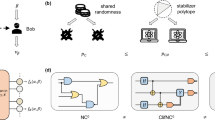Abstract
In this paper we explore the power of quantum computers with restricted amplitudes. Adleman, DeMarrais and Huang showed that quantum Turing machines (QTMs) with the amplitudes from A = {0,±3/5, ±4/5 ,±1} are equivalent to ones with the polynomial-time computable amplitudes as machines implementing bounded-error polynomial time algorithms. We show that QTMs with the amplitudes from A is polynomial-time equivalent to deterministic Turing machines as machines implementing exact algorithms. Extending this result, it is shown that exact computers with rational biased ‘quantum coins’ are equivalent to classical computers. We also show that from the viewpoint of zero-error algorithms A is not more useful than B = {0,± 1/√2 ,±1} but suficient for the factoring problem as the set of amplitudes taken by QTMs.
Access this chapter
Tax calculation will be finalised at checkout
Purchases are for personal use only
Preview
Unable to display preview. Download preview PDF.
Similar content being viewed by others
oReferences
L. M. Adleman, J. DeMarrais, and M. A. Huang: Quantum computability. SIAM J. Comput. 26 (1997) 1524–1540.
L. Adleman and M. Huang: Recognizing primes in random polynomial time. in Proc. of 19th ACM Symposium on Theory of Computing, ACM (1987) 462–470.
A. Berthiaume and G. Brassard: Oracle quantum computing. J. Modern Opt. 41 (1994) 2521–2535.
A. Barenco, C. H. Bennett, R. Cleve, D. DiVicenzo, N. Margolus, P. Shor, T. Sleator, J. Smolin and H. Weinfurter: Elementary gates for quantum computation. Phys. Rev. A, 52 (1995) 3457–3467.
E. Bernstein and U. Vazirani: Quantum complexity theory (Preliminary abstract). in Proc. of 25th ACM Symposium on Theory of Computing, ACM (1993) 11–20.
E. Bernstein and U. Vazirani: Quantum complexity theory. SIAM J. Comput. 26 (1997) 1411–1473.
G. Brassard and P. Høyer: An exact quantum polynomial-time algorithm for Simon’s problem. in Proc. of 5th Israeli Symposium on Theory of Computing and Systems, IEEE (1997) 12–23.
C. H. Bennett, E. Bernstein, G. Brassard, and U. Vazirani: Strengths and weaknesses of quantum computing. SIAM J. Comput. 26 (1997) 1510–1523.
D. Deutsch: Quantum theory, the Church-Turing principle and the universal quantum computer. Proc. Roy. Soc. London Ser. A, 400 (1985) 96–117.
D. Deutsch: Quantum computational networks. Proc. Roy. Soc. London Ser. A, 425 (1989) 73–90.
D. Deutsch and R. Jozsa: Rapid solution of problems by quantum computation. Proc. Roy. Soc. London Ser. A, 439 (1992) 553–558.
S. Fenner, F. Green, S. Homer and R. Pruim: Determining acceptance probability for a quantum computation is hard for PH. in Proc. 6th Italian Conference on Theoretical Computer Science, World-Scientific (1998) 241–252
L. Fortnow and J. Rogers: Complexity limitations on quantum computation. in Proc. 13th Conference on Computational Complexity, IEEE (1998) 202–209.
Ker-I. Ko and H. Friedman: Computational complexity of real functions. Theoret. Comput. Sci. 20 (1982) 323–352.
A. Kitaev: Quantum computations: algorithms and error correction. Russian Math. Surveys 52 (1997) 1191–1249.
M. A. Nielsen and I. L. Chuang: Quantum Computation and Quantum Information, Cambridge (2000).
H. Nishimura and M. Ozawa: Computational complexity of uniform quantum circuit families and quantum Turing machines. Theoret. Comput. Sci. (to appear). Also quant-ph/9906095 2.
M. Ozawa: Quantum nondemolition monitoring of universal quantum computers. Phys. Rev. Lett. 80 (1998) 631–634.
M. Ozawa and H. Nishimura: Local transition functions of quantum Turing machines. RAIRO Theoret. Informatics Appl. 34 (2000) 379–402.
C. H. Papadimitriou: Computational Complexity, Addison-Wesley (1994).
J. Preskill: Reliable quantum computers. Proc. Roy. Soc. London ser A, 454 (1998) 385–410.
D. Simon: On the power of quantum computation. in Proc. 35th IEEE Symposium on Foundations of Computer Science, IEEE (1994) 116–123; SIAM J. Comput. 26 (1997) 1474–1483.
P. W. Shor: Algorithms for quantum computations: Discrete log and factoring. in Proc. 35th IEEE Symposium on Foundations of Computer Science, IEEE (1994) 124–134.; Polynomial-time algorithms for prime factorization and discrete logarithms on a quantum computer. SIAM J. Comput. 26 (1997) 1484–1509.
P. W. Shor: Fault-tolerant quantum computation. in Proc. 37th IEEE Symposium on Foundations of Computer Science, IEEE (1996) 56–65.
U. V. Vazirani and V. V. Vazirani: Random polynomial time equals semi-random polynomial time. in Proc. 26th IEEE Symposium on Foundations of Computer Science, IEEE (1985) 417–428.
K. Wagner: The complexity of combinatorial problems with succinct input representation. Acta Inf. 23 (1986) 325–361.
T. Yamakami: A foundation of programming a multi-tape quantum Turing machine. in Proc. 24th International Symposium on Mathmatical Foundations of Computer Science, Lecture Notes in Comput. Sci. 1672 (1999) 430–441.
T. Yamakami and A. Yao: NQPC = co-C=P. Inform. Process. Lett. 71 (1999) 63–69.
A. Yao: Quantum circuit complexity. in Proc. 34th Annual IEEE Symposium on Foundations of Computer Science, IEEE (1993) 352–361.
Author information
Authors and Affiliations
Editor information
Editors and Affiliations
Rights and permissions
Copyright information
© 2002 Springer-Verlag Berlin Heidelberg
About this paper
Cite this paper
Nishimura, H. (2002). On Quantum Computation with Some Restricted Amplitudes. In: Alt, H., Ferreira, A. (eds) STACS 2002. STACS 2002. Lecture Notes in Computer Science, vol 2285. Springer, Berlin, Heidelberg. https://doi.org/10.1007/3-540-45841-7_25
Download citation
DOI: https://doi.org/10.1007/3-540-45841-7_25
Published:
Publisher Name: Springer, Berlin, Heidelberg
Print ISBN: 978-3-540-43283-8
Online ISBN: 978-3-540-45841-8
eBook Packages: Springer Book Archive




